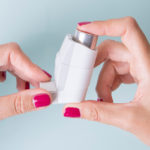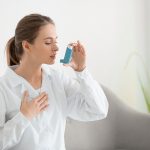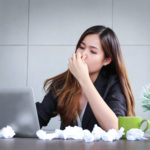April 25, 2019
Springtime buds and blooms are a welcome sight, but when they bring on seasonal allergies they’re a little harder to love. What is it about certain times of year that make our noses run, eyes itch, and heads pound?
Small particles in the air, including pollen, mold, and dust are the culprits. Depending on the time of year, different particles can trigger different allergies. Texans, for instance, know very well that the winter brings on dreaded “cedar fever” from the pollen of cedar trees. People who have allergic reactions to certain particles experience inflammation, as their bodies react to the foreign materials as if they are dangerous and must be attacked.
Depending on what time of year it is and where you live, you might have multiple allergic reactions throughout the year. Molds, for instance, thrive in hot and humid weather, which trees, grass, and ragweed pollens are most abundant during cooler nights and warm days.
Typical Symptoms
Symptoms can vary quite a bit depending on the individual and the allergen in questions. Allergy symptoms typically include:
- Chest and nasal congestion
- Itchy or watery eyes
- Skin reactions, including rashes and eczema
- Headaches
- A feeling of fogginess
Treatment Options
If allergies are affecting you on a regular basis, a good first step is to see an allergist and determine exactly what environmental allergens affect you.
There are some easy steps anyone can take, especially during high pollen times of year, to simply avoid exposure to certain allergy triggers: keep windows and doors shut when mold and pollen counts are higher, and plan to stay inside on windy days; shower at the end of the day to remove pollen from your body and hair; avoid outside chores or wear a pollen-filtering mask if you’re doing them.
Using a saline solution to rinse nasal passages can also relieve nasal congestion and get allergens out of your nose. Make sure to use water that’s been boiled or is distilled or sterilized – never tap water.
Over-the-counter medications can help manage symptoms. The most common types include oral antihistamines, decongestants, nasal spray, and combination medications like loratadine-pseudoephedrine (Claritin-D) and fexofenadine-pseudoephedrine (Allegra-D).
There are also a number of alternative treatments for seasonal allergies. Those include herbal remedies like butterbur, stinging nettle leaf, rosemary, and turmeric, as well as garlic. Some acupuncturists also offer allergy treatment.
If over-the-counter or herbal medication isn’t cutting it, your doctor may recommend further testing, through a blood or skin test, to help find the best treatments for you. Immunotherapy, or allergy shots, are a popular treatment for those who feel immobilized by seasonal allergies. The regular injections contain small amounts of the particles causing an allergic reaction, and regular exposure to those small doses of the allergen can reduce your body’s immune reaction to them. Immunotherapy can also sometimes come in pill form.
Healthcare Associates of Texas can work with you to determine the best treatment if seasonal allergies are causing you discomfort. Schedule an appointment or call us today at (972) 258-7499.
Sources:
https://www.mayoclinic.org/diseases-conditions/hay-fever/in-depth/seasonal-allergies/art-20048343
https://www.texanallergy.com/allergies
https://acaai.org/allergies/seasonal-allergies
https://health.usnews.com/health-news/blogs/eat-run/articles/2017-05-19/the-5-best-herbs-for-spring-allergy-relief
https://www.reviews.com/allergy-medicine/
DISCLAIMER
The information featured in this site is general in nature. The site provides health information designed to complement your personal health management. It does not provide medical advice or health services and is not meant to replace professional advice or imply coverage of specific clinical services or products. The inclusion of links to other web sites does not imply any endorsement of the material on such websites.
Ready to become your healthiest self?
Get tips delivered to your e-mail inbox every month. Let’s get happier and healthier together!



